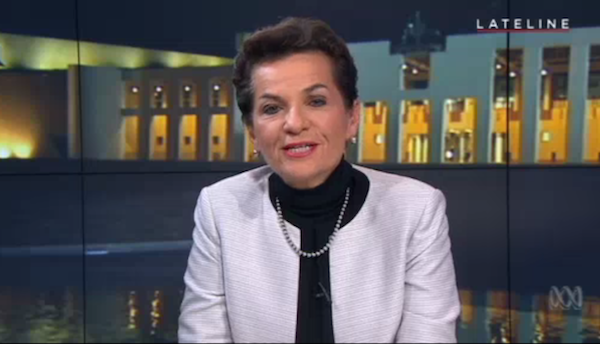The two weeks of international climate negotiations that wrapped up in Germany last week have been hailed as a modest but important success in the lead up to this year’s Paris climate talks after the transitional discussion in Bonn yielded a mixed bag of obstinacy and steady progress from key nations.
Progress was uninspiring to start with and after nearly two weeks just four pages had been pruned from the 89 page working agreement but it is hoped a last minute decision to allow co-chairs from the United States and Algeria to rework the draft will speed the process.
The revised draft will need to be endorsed by the nearly 200 member nations participating in the United Nations talks when they next meet in August ahead of the final agreement to be struck in Paris this December.
The Paris pact will aim to limit the rise in global temperatures to below two degrees Celsius above pre-industrial levels, a political construct that emerged from the Copenhagen talks in 2009 as the level of climate change recognised as ‘dangerous’.
The Executive Secretary of the United Nations Framework Convention on Climate Change, who is steering the UN negotiations, said that Bonn had helped build a good platform for moving towards a final deal.
"The path to Paris is now happening on both the political and negotiating levels and with a mood of exceptional confidence and engagement,” Christiana Figueres said.
“What is being managed here is no longer resistance to an agreement but complexity, enthusiasm and an understanding that every nation is playing its part,” she said.
Responding to a surprise contribution by the ‘Group of Seven’ nations Figueres said that “negotiations are also occurring against the backdrop of an accelerating wave of climate action”.

In an unexpected communique G7 nations announced their intention to ‘decarbonise’ their economies by the end of the century, starting by cuts to emissions at the “upper end” of the 40 to 70 per cent cut by 2050 as recommended by the Intergovernmental Panel on Climate Change.
The communique also revitalised the important commitment from wealthy nations to assist emerging economies to mitigate and adapt to climate change by announcing their continued aspiration to provide $100 billion of funding to help developing nations leap-frog fossil fuels on the path to clean energy.
The United Nations greeted the move as a “major impetus” behind the push for an effective climate pact and Figueres said it showed “governments are committed to reach an agreement that sets down the pathways and the supporting structures for a century-long transformation that allows all countries to reach a sustainable clean energy future”.
However the climate chief also highlighted the crucial role of ‘non-state players’, which a new report from the United Nations Environment Program recently found could bring emissions savings of close to 1.8 gigatonnes of carbon dioxide equivalent by 2020.
Initiatives already announced by governments are expected to account for reductions of between five and seven gigatonnes equivalent by the end of the decade so these ‘non-state players’, which include cities and state governments, are significant.
Australia has seen agitation from ‘non-state players’ over recent weeks with the state governments increasingly keen to develop their own renewable energy schemes as federal parliamentarians continue to wrestle over the future of the national Renewable Energy Target.
Last week also brought the news that another coal-fired power station will close down, with Alinta Energy announcing its Port Augusta coal-fired power station will follow Alcoa’s Anglesia plant into retirement.
While actions have accelerated in some parts of the Australian economy, the federal government’s climate credentials came under the microscope at Bonn with Australia faced by a record number of questions from other nations.
In addition to the 36 questions posed through an online portal over recent weeks, Australian officials also fielded a range of in-person questions from nations like the USA, China, Brazil, Korea and the UK.
The World Wildlife Fund’s National Manager, Kellie Caught, was at the meeting and said the questions show there “is clear concern that Australia is not lifting its weight and the government’s actions don’t match their words”.
Caught said that other countries were most concerned about the scrapping of Australia’s emissions trading scheme and whether the government’s new policy, the $2.5 billion Emissions Reductions Fund, would be enough to meet our 2020 pollution reduction target.
The federal government is currently gunning for a five per cent reduction on 2000 level emissions, and will announce its targets for the post-2020 period in June this year.
The government has never substantiated its claim that the policy will ensure Australia meets its low-bar target through the Emissions Reduction Fund, which pays polluters to reduce emissions, and analysts have expressed widespread scepticism.
The government is currently consulting over its future contributions to the international effort to stick within the two degree guard rails but Environment Minister Greg Hunt has given recommendations for a 30 per cent cut over the next decade from the advisory Climate Change Authority a lukewarm reception.
It’s a recalcitrance that was echoed by comments from the Prime Minister on Thursday, when Tony Abbott revealed that the government had set out to stymie the deployment of renewable energy.
Despite Australia’s apparent carbon remission, Figueres said the international community is on track for an effective deal at Paris.
"What is occurring is in many ways unprecedented in the history of international cooperation in respect to vision and scale,” Figueres said.
“Everyone’s concerns are being accommodated and everything has to move in parallel. It is understandably a complex but now also a very dynamic process”.
Another series of transitionary talks designed to support the Paris agreement will be held in Bonn from 31 August to 4 Septembers.
Donate To New Matilda
New Matilda is a small, independent media outlet. We survive through reader contributions, and never losing a lawsuit. If you got something from this article, giving something back helps us to continue speaking truth to power. Every little bit counts.



